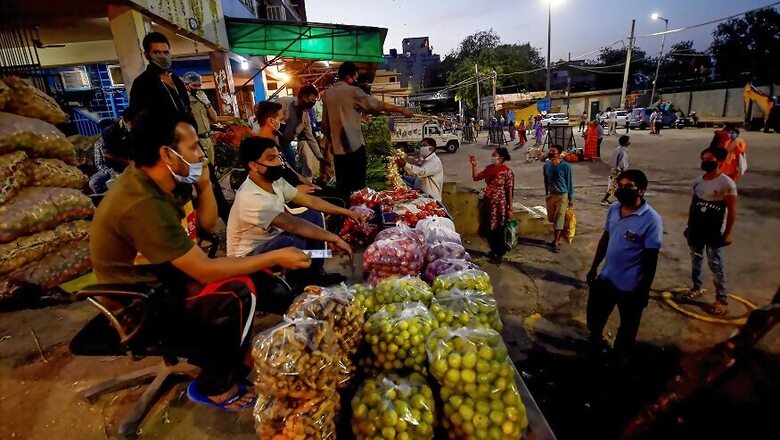
views
Chennai had reported just 26 Covid-19 cases by April 1. By mid-April the number had reached 219 but things were still under control. A little over a month later, on May 12, the infections had skyrocketed and the cumulative number stood at 4,882. The state-capital now accounts for more than half of Tamil Nadu’s total 8,700 cases.
The main reason for this sudden spike is a new superspreader – the Koyambedu Vegetable Market in Chennai. The market is spread over 64 acres in the central part of the city and had been linked with 2,005 Covid-19 cases as on May 9 – accounting for 60% of the total cases in the state capital. It is now the epicentre of the largest cluster of the pandemic in Tamil Nadu. Interestingly, the number of cases linked to the Koyambedu Market has surpassed the number linked to the Tablighi Jamaat congregation – the Markaz was responsible for 1,350 cases in the state.
The state authorities took a big risk in keeping the market open in the midst of a pandemic without taking adequate precautionary measures. The market saw overcrowding, congestion and panic buying whenever new restrictions were announced. There was more rush a day ahead of the Tamil New Year on April 14. By the end of the month, the Koyambedu Market had become a Covid-19 hotspot with the infection spreading to previously less-affected districts of the state as labourers made their way back from the market to their hometowns.
But Koyambedu is not a standalone example. And that is the big worry for India.
A new breed of superspreaders is emerging in the country – from vegetable markets to kirana stores, from the local milkmen to the fruit sellers. People who provide the community with their daily essentials. People who we are dependent on for our everyday necessities.
Ahmedabad is the second-worst affected hotspot in the country with 6,086 reported cases as on May 11. The largest Gujarati city accounts for 400 of the total 513 deaths in the state , i.e., 78% , and has seen a steep surge in mortality in May. Of the total 299 deaths in Gujarat this month, Ahmedabad has accounted for as many as 251.
As many as 334 Covid-19 superspreaders have been identified in the city so far, prompting the authorities to enforce a strict lockdown and keep shops of groceries and vegetables shut till May 15.
A watermelon vendor tested positive in Dholka, on the outskirts of Ahmedabad. 96 people, who were his contacts which included his regular customers, had to be quarantined. 12 tested positive. The authorities have already screened 2,000 of the potential 14,000 suspected superspreaders in the city.
Jaipur had last week reported 10 positive cases among fruit and vegetable vendors, prompting the district administration to carry out aggressive testing. “Our major focus is now on superspreaders such as vegetable vendors, dairy booths, grocery and medical shops – these are the direct points of interaction. Many incidents in past few days have come up where the vegetable vendor had spread the infection,” principal secretary, department of energy and nodal officer for Jaipur, Ajitabh Sharma told a media group.
Tracing is a major challenge with these vendors as most of them are mobile. There has also been a significant increase in the number of fruit and vegetable vendors post the coronavirus outbreak with people from other trades joining the profession. A large number of people come in contact with these vendors as they depend on them for their daily requirements. This increases the probability of the spread of the infection.
Residents of Mancheswar and Surya Nagar in Odisha’s capital Bhubaneswar are concerned after a biryani delivery boy tested positive for Covid-19 last week while a vegetable vendor in Lucknow’s Lalbagh infected 10 other people with the novel coronavirus.
Around 300 shops were shut in Delhi’s Azadpur Mandi – Asia’s largest wholesale fruit and vegetable market – in the last week of April after the death of a trader who had tested positive. The Mandi is a nightmare for health authorities as it has 2,800 shops all closely stacked together. A total of 18 cases have been reported so far from there.
The infection also spread to the neighbouring district of Jhajjar in Haryana, barely 60 km from Azadpur. Jhajjar reported 73 Covid-19 cases from 11 vegetable vendors who visited the Azadpur Mandi.
Another vegetable vendor tested positive for the virus in Gurugram’s Khandsa Mandi on May 4 and was arrested last Saturday after failing to report to the authorities. The police said the man was guilty of roaming around freely and visiting the market despite knowing that he was Covid-19 positive. Contact tracing of the 100 people he came in contact with has started. A total of 24 vegetable vendors have tested positive at the Mandi so far. More than 1,600 people have been placed under surveillance.
Just last week 28 vegetable sellers in Agra and 24 vendors in Meerut’s Naveen Mandi tested positive for the virus, triggering panic among buyers in the two Uttar Pradesh towns.
The Tughalakabad Extension area in Delhi became a big hotspot in the second half of April after 51 people who came in contact with a local grocery store owner tested positive.
The problem for the administration with this new breed of superspreaders is that in most cases, unlike with other super spreaders like religious congregations, there is no evidence of travel which makes it almost impossible to find the source of the infection. Also, most of them are asymptomatic which makes it difficult to identify them. The challenge for the administration will only increase in the days to come with the opening of the economy and relaxation of the lockdown.
Local kirana shops, vegetable vendors and milkmen are the lifeline of the Indian community. The administration will have to devise ways to regulate and monitor their health and movement. Protecting them will ensure the protection of the entire community.
















Comments
0 comment